Footnotes
| This article about an Albanian politician is a stub. You can help Wikipedia by expanding it. |
Aurel Bylykbashi | |
|---|---|
| Member of the Albanian parliament | |
| Assumed office 2011 | |
| Personal details | |
| Political party | Democratic Party |
Aurel Bylykbashi is a member of the Assembly of the Republic of Albania for the Democratic Party of Albania. [1] He joined the assembly after the resignation of 3 members at the 2011 Albanian local elections.
| This article about an Albanian politician is a stub. You can help Wikipedia by expanding it. |
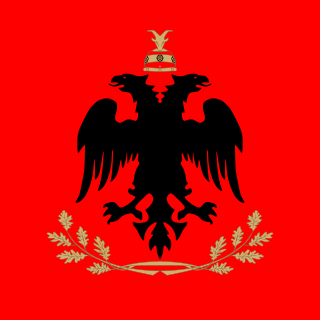
The president of Albania, officially styled President of the Republic of Albania is the head of state, commander-in-chief of the military and the representative of the unity of the Albanian people.
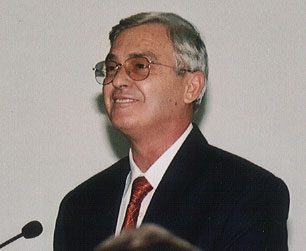
Rexhep Qemal Meidani is an Albanian physics professor, diplomat and politician. Meidani was the 3rd President of Albania to be elected after the first multi-party elections in 1991.

The Assembly of the Republic of Kosovo is the legislative institution of the Republic of Kosovo that is directly elected by the people every four years. It was originally established by the United Nations Interim Administration Mission in Kosovo in 2001 to provide 'provisional, democratic self-government'. On February 17, 2008, representatives of the people of Kosovo unilaterally declared Kosovo's independence and subsequently adopted the Constitution of Kosovo, which came into effect on 15 June 2008.
Regular elections in Albania are mandated by the Constitution and legislation enacted by Parliament. The Parliament (Kuvendi) has 140 members elected for four-year terms. The electoral system is closed list proportional representation. There are 12 multi-member constituencies corresponding to the country's 12 administrative regions. Within any constituency, parties must meet a threshold of 3 percent of votes, and pre-election coalitions must meet a threshold of 5 percent of votes.

The Parliament of Albania or Kuvendi is the unicameral representative body of the citizens of the Republic of Albania; it is Albania's legislature. The Parliament is composed of not less than 140 members elected to a four-year term on the basis of direct, universal, periodic and equal suffrage by secret ballot. The Parliament is presided over by a Speaker of the Parliament, who is assisted by at least one deputy speaker. The electoral system is based on party-list proportional representation. There are 12 multi-seat constituencies, corresponding to the country's administrative divisions.
Vetëvendosje is a progressive, social-democratic, Albanian nationalist political party in Kosovo. It is the largest political party in Kosovo.

The Republic of Kosova or First Republic of Kosovo was a self-declared proto-state in southeastern Europe established in 1991. During its peak, it tried to establish its own parallel political institutions in opposition to the institutions of the Autonomous Province of Kosovo and Metohija held by Yugoslavia's Republic of Serbia.

The Socialist Republic of Serbia, previously known as Federal State of Serbia and People's Republic of Serbia, commonly referred to as Socialist Serbia, or simply as Serbia, was one of the six constituent republics of the Socialist Federal Republic of Yugoslavia and the nation state of the Serbs. It was the largest constituent republic in terms of population and territory. Its capital, Belgrade, was also the federal capital of Yugoslavia.
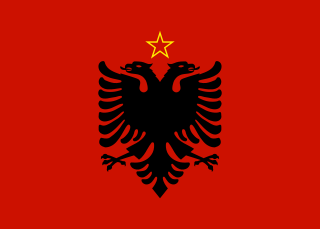
Albania, officially the People's Socialist Republic of Albania, was ruled by a Marxist-Leninist government from 1946 to 1992. From 1944 to 1946, it was known as the Democratic Government of Albania and from 1946 to 1976 it was known as the People's Republic of Albania.
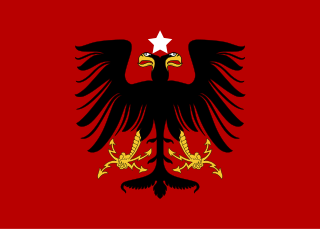
The Principality of Albania refers to the short-lived monarchy in Albania, headed by William, Prince of Albania, that lasted from the Treaty of London of 1913 which ended the First Balkan War, through the invasions of Albania during World War I and the subsequent disputes over Albanian independence during the Paris Peace Conference of 1919, until 1925, when the monarchy was abolished and the Albanian Republic declared.
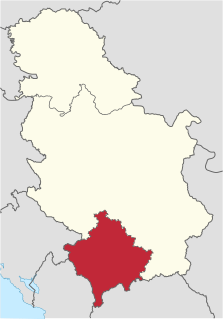
The Autonomous Province of Kosovo and Metohija, commonly known as Kosovo and Metohija or Kosovo for short and abbreviated as KiM or Kosmet, refers to the region of Kosovo as defined in the Constitution of Serbia. The territory of the province is disputed between Serbia and the self-proclaimed Republic of Kosovo, the latter of which has de facto control. The region had functioned as part of Serbia for most of the period between 1912 and 1999.

The Albanian Declaration of Independence was the declaration of independence of Albania from the Ottoman Empire. Independent Albania was proclaimed in Vlorë on 28 November 1912. Six days later the Assembly of Vlorë formed the first Government of Albania which was led by Ismail Qemali and the Council of Elders (Pleqnia).
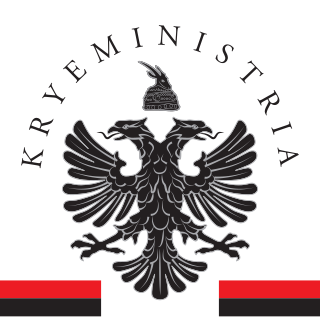
The Council of Ministers is the executive branch that constitutes the Government of Albania. The Council is led by the Prime Minister of Albania. The prime minister is nominated by the President from among those candidates, who enjoy majority support in the Parliament; the candidate is then chosen by the Parliament. In the absence of the prime minister, the Deputy Prime Minister takes over his functions. There are 19 other government members, serving as deputy prime ministers, government ministers or both; they are chosen by the prime minister and confirmed by the Parliament.
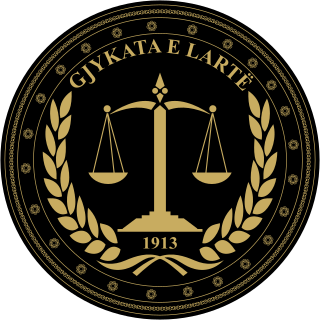
The Supreme Court of the Republic of Albania is the highest court of Albania and is the final court of appeal in the judicial system of Albania. It is composed of seventeen judges, the Chief Justice and sixteen Members.

The Central Election Commission, commonly abbreviated in Albanian as KQZ, is a permanent, non-independent partisan statutory agency responsible for conducting parliamentary and local elections in the Republic of Albania. The Commission, which overlooks the local election commissions in the country is made up of 7 party affiliated members representing the distribution of seats in the Albanian Assembly.
The Assembly of Vlorë was an Albanian assembly constituted during the All-Albanian Congress in Vlorë, on November 28, 1912.

The People's Advocate is the Albanian office of the ombudsman, a justice-advising entity to the public.

The Republic of Albania and the State of Palestine established diplomatic relations in 1990. Albania had already recognized the State of Palestine as a state since 1988. Palestine has an embassy in Tirana but Albania does not have an embassy in Palestine. Both are member of the Organisation of Islamic Cooperation.

Vangjel Dule is a representative of the Greek minority in Albania. He is from 2002 the chairman of the Unity for Human Rights Party, which represents the Greek communities in the Albanian parliament.
The People's Socialist Republic of Albania joined the United Nations on 14 December 1955, and has participated in several UN peacekeeping operations. The current Representative of Albania in the UN is Ms. Besiana Kadare.